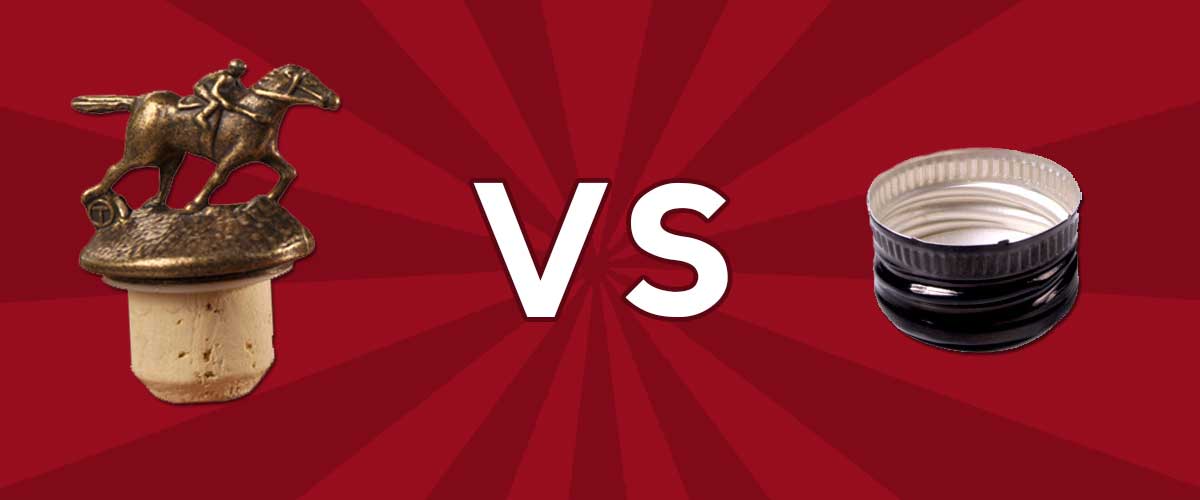Screw Caps vs Corks: Which Do You Prefer?
Whiskey evaporates. That’s the natural course of the whole whiskey aging process. The industry term is angel’s share. Distillers have a love/hate relationship with the angels. That evaporation is a beautiful thing – at one end, it increases proof and helps create that deliciousness we all crave.

Whiskey evaporates. That’s the natural course of the whole whiskey aging process. The industry term is angel’s share. Distillers have a love/hate relationship with the angels. That evaporation is a beautiful thing – at one end, it increases proof and helps create that deliciousness we all crave. At the other end, it steals the amount of liquid sunshine they can bottle.
There is a completely evil side of evaporation. No, I’m not here to introduce Mila Kunis and this isn’t a review of Jim Beam’s Devil’s Cut. I’m talking about something most of us fear when we buy and hold something long-term: An unexpected empty or near-empty bottle.
There has been a solid movement in the wine industry to move from corks to screw caps. For example, in both Australia and New Zealand, a screw cap is the dominant way vintners seal their bottles. The trend is growing in Spain, South Africa, the USA and yes, even France.
Why are wine makers becoming more and more accepting of screw tops? The primary reason is the failure rate is extremely low – the seal is almost foolproof.
The screw top seems to be something we treat with a snooty, snotty factor.
Popping a cork has a certain romantic sense to it. Perhaps that’s why it is used so much. Cork seems to connote quality. Wine and spirit producers even proudly stamp their names on their corks. Buffalo Trace cranks it up a notch with Blanton’s collectible stoppers (Collect them all!). The screw top seems to be something we treat with a snooty, snotty factor (Like, OMG, that’s totally loser!).
While perusing my own collection, I’ve noticed my top- and mid-shelf whiskeys are all corked, either with natural or synthetic. When I look at my bottom-shelf dwellers, they have mostly screw top closures. Some use cork.
Corks go bad and taint exists. Some suggest the alcohol in the whiskey sterilizes any germs or bacteria, and while that’s probably true, it gives me the (ugh!) shudder effect. I know people who suggest to simply strain the whiskey through cheesecloth or something similar and then pour the whiskey back in the bottle. I’d have the hurdle of getting over that ickiness in the bottle and how it mixed with my whiskey.
A more common problem is corks break off, crack, or simply disintegrate. My solution is to simply keep a supply of corks around. If I’m lucky, I have a cork from the same label, so the fit isn’t a huge concern. I’ve gone as far as using a rubber wine stopper. It isn’t always a perfect seal, but it sure beats the alternative of leaving it out for the angels to enjoy.
Cork also limits how a bottle can be stored. With whiskey, you should not store a bottle on its side. When your whiskey interacts with the cork, it can potentially change the flavor profile after a long period of exposure. However, the bigger risk is the high alcohol content will actually dry out the cork, which will loosen the seal and increase the chance of that evil evaporation and leakage.
Even synthetic cork has its limitations. I remember visiting a distillery gift shop in Kentucky, and when making my purchase, I was warned the bottles were recently sealed and to be wary of the cork loosening if there were any pressure changes. This tells me even our great distilleries are aware of the trust concern with corks.
I have a bottle of sealed Usquaebach Scotch that was stored in the back of my father’s liquor cabinet for several years. Unfortunately, it is completely empty. The bottle is attractive, which is why I kept it, but it would have been nice to sip that whisky.
What if someone like Buffalo Trace led the charge and put screw tops on their Antique Collection or (gasp), heaven-forbid, Pappy?
Would it change your opinion on the quality of the whiskey inside?
Sound off in the comments and let us know what you think about screw caps vs corks.
